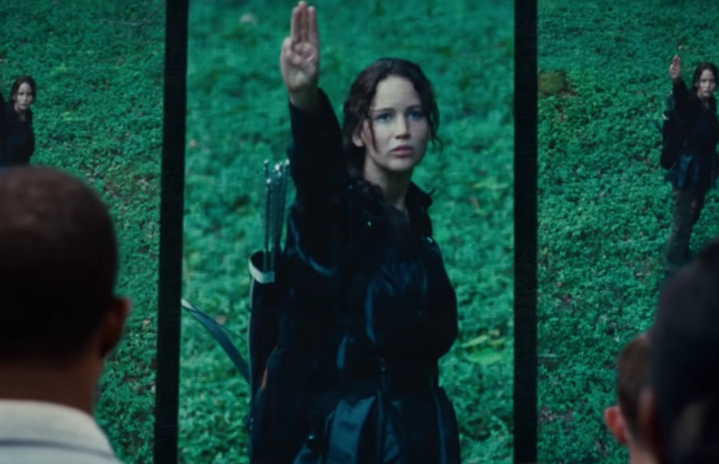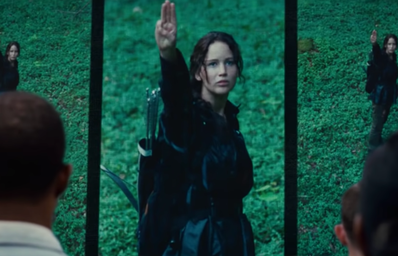Ladies and gentlemen, I’m so happy to say that thanks to the newest movie addition to the series, we are officially in a “The Hunger Games” Renaissance. From cringy edits on social media apps, to philosophical deep dives on the morality of Panem, “The Hunger Games” is making a comeback as one of the most talked about series this holiday season.
As an OG fan, I couldn’t be more excited to have more opportunities and excuses to talk about one of my favorite topics from my young adulthood, and I will take any chance I get to info-dump about the pure genius that is the author of the series, Suzanne Collins. If you’ve had any contact with the series, it’s obvious that the amount of thought and planning that went into the creation of Panem is one of a kind. Even looking at other similar YA dystopias, none comes close to the intricacy and moral depth within Collins’s world, and for that reason, I will defend this series until my last breath. So, without further ado, here are some connections between “The Ballad of Songbirds and Snakes” and the original “The Hunger Games” series that prove Suzanne Collins is the ultimate mastermind.
- The Meadow Song
One of the most striking moments in the first “Hunger Games” is when Katniss sings “The Meadow Song” to a dying Rue: the twelve year old tribute from District 11 who reminds Katniss of her younger sister, Prim. While we know that many of Lucy Grey Baird’s songs (most notably “The Hanging Tree”) are still sung during Katniss’s childhood 60 years later, this one is a more subtle reference that only book readers might have caught on to. In “TBOSAS”, Lucy Grey writes “The Meadow Song ” for Maude Ivory, the young Covery girl that she takes under her wing as a little sister, since they were both orphaned in District 12 at a young age. Not only is it bittersweet that someone still sings her song, but Lucy Grey also remarks that one of the youngest tributes in her Hunger Games reminds her of Maude Ivory, tying together the protective relationship between sisters that “The Meadow Song” comes to represent.
- Speaking of Maude Ivory…
Maude Ivory is described as a pale, bright blonde, sweet natured girl whose largest character trait is that she can remember any melody after hearing it just once or twice. Not only is that implied to be the reason Lucy Grey’s songs withstand the test of time, but there is another important character that shares this same trait: Katniss’s father.
In the first book, when Katniss asks Peeta when he first fell in love with her, he tells the story of how his father loved Katniss’s mother, but she was lured away from him by the coal miner with the beautiful voice that could remember any tune. One day, young Katniss volunteered to sing a song for the class. Peeta knew the second she started singing that he, like her mother, was a goner. It’s implied because of this shared trait, as well as Primrose’s similar features to Maude Ivory, that Maude Ivory is Katniss’s paternal grandmother.
- Tigris
In the newest installation, Tigris is introduced to us as President Snow’s hardworking cousin who provides for her family by working hard within the fashion industry. You may remember her from “Mockingjay Part II”, when she turns against the Capitol by providing a safehouse for Katniss and the other rebels.
There are a number of subtle nods connecting young Tigris and old Tigris, including her later occupation as the owner of an exotic clothing store, and the fact that we learn that she used to be a stylist for the games, but she was fired once Snow got tired of her.
This implies a lot of things; firstly that Tigris’s passion and success in fashion carries throughout her entire life, and secondly that she was probably fired after a while because she reminded Snow of who he used to be before the richness and corruption within the inner workings of the games took him away from that. Based on “TBOSAS”, we know that Tigris didn’t like the dark road Snow was heading down. She might have tried to confront him about it, and lost her job as a stylist for the games. It also explains why she would turn her back on her family and her home and help Katniss, showcasing her morals and dedication to humanity that we see in the prequel.
Also, a much smaller and book-only connection that I think is interesting, is Tigris’s habit of eating raw meat. In “Mockingjay”, we assume that it’s a play on her name and (highly modified) appearance, but it’s revealed in the prequel that it’s a habit she’s had since childhood. We can assume that, as the main caretaker of a family falling into poverty, Tigris probably prepared all of the food, and oftentimes might have rushed to eat the meat before it was cooked because she was just so hungry. Also, it’s very possible that the electricity and power in the Snow penthouse wasn’t the most reliable, and she could have acquired the habit out of necessity thanks to lack of power.
- Everyone’s favorite nepo baby: Caesar Flickerman
Okay, this is a pretty obvious one, but it’s too funny not to mention. We learn in the prequel that the first ever announcer was none other than the father of Mr. Flickerman himself, Lucky Flickerman. Through oddly timed humor and an acute social unawareness, Lucky served as a bit of (mildly disturbing) comic relief in an otherwise very dismal setting, much like his son does in the later installations. Both Flickermans are used as personifications of the desensitization that happens in the name of entertainment. Their blatant lack of sympathy for the literal children fighting to the death on screen seems of no worry to them as they sit and joke with the audience and even the tributes themselves. Collins uses both of them as a tool to sum up one aspect of what’s so wrong with the Hunger Games: painting a very colorful and often charming picture of the cruelty in the same way it’s feeded to Capitol citizens for their entire lives.
A slightly more lighthearted note, Lucky cancels his dinner reservations during the Games for “two adults and a high chair”, presumably talking about baby Caesar.
- Seneca and Arachne Crane
The name of the stuck up and cruel Capitol student who was killed after taunting her tribute at the zoo in TBOSAS may have caught your attention. The reason it sounds so familiar is because there is another Crane who plays a part in the games: Seneca Crane, head gamemaker of the 74th games from the first installation of the series.
Seneca was the gamemaker who allowed two tributes to win, exposing a weakness in the Capitol fortitude and giving in to, as it’s later perceived, an act of rebellion by Katniss. This makes him an instant enemy of President Snow, who makes sure he’s out of the picture by the time “Catching Fire” begins.
This connection shows two things: Snow might have had it out for Seneca since the beginning, since Snow had a personal feud with his family member, who he grew up with. Snow could have seen the berry trick as more of a failure because he was looking for failure. Am I saying Katniss’s actions weren’t rebellious? No, they absolutely were. Snow’s pettiness just might have played a part in his ultimate freakout and possible overreaction. It’s also important because Collins is showing us here just how important familial connections are within the Capitol. Seneca is clearly not very competent for the job; he’s pompous and vain, and panics in high stress situations. But, since his family is old Capitol money, he was instated anyways thanks to his privilege and not necessarily his qualifications. This further establishes the Capitol as strictly a plutocracy, not the democracy or inclusive place that it claims to be to all of its citizens.
- And the Heavensbees
Similarly, the name President Heavensbee in “TBOSAS” may ring a bell. His direct relative is Plutarch Heavensbee, the head gamemaker in “Catching Fire”, who proves to be one of District 13’s most valuable undercover allies within the Capitol. The revelation that Plutarch’s relative was once the president of Panem tells us a few things about his character.
First, it implies that there was a lot of character development throughout Plutarch’s life to lead him to be disloyal to a nation that has placed his family on a pedestal for generations. From the moment that we learn of his true allegiance, his motivations were not about money or status– he already has both of those things–and would continue to have them even without his job as head gamemaker. He chose to stay in that position only so that he could be of service to the rebels: establishing him as a very valuable and trustworthy ally. It also deepens the irony behind his name, “Plutarch”. While we assume at first that he’s named on the basis of the word “plutocracy” which means a government ruled by the rich, we later learn that the meaning behind his name is in fact after the Greek philosopher Plutarch, who believed in freedom of will, personal improvement, and social mobility– quite the opposite of the plutocracy we know the Capitol to be.
- The bow and arrow
In “TBOSAS”, the run to the middle is, like in all Games, a complete madhouse and bloodbath. We see that almost everything is destroyed, all of the weapons (because at the time, it was only weapons) are taken, and the uneven terrain is left demolished by the tributes. However, it’s only after we see Coriolanus creep into the arena to retrieve Sejanus that we realize that one weapon is left untouched– the bow and arrow. As Snow steals in, left vulnerable and put in danger by the tributes, the bow and arrow taunt him from the middle of the arena. Seems a little bit symbolic.
People often ask me what I could possibly use my degree as an English major for, and this is it. “The Hunger Games” truly does rival things like “Jane Eyre” and Shakespeare’s plays in its levels of innuendo and deep connections throughout the text. I hope this list has enlightened you to the absolute genius that Suzanne Collins put into her work, and encourages you to go searching for other connections that I may not have included! There are most definitely more. May the odds be ever in your favor.


